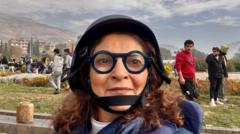As a BBC reporter who once faced threats from the Assad regime, my recent return to Syria feels surreal. Eleven years ago, I fled Damascus amid the violent upheaval following President Bashar al-Assad's crackdown on democracy protests. The streets were dangerous, and the atmosphere was thick with fear as civilians faced arbitrary shootings and detentions.
I was in the thick of it, reporting on Syria's tragic transition from civil protest to armed conflict. My time spent documenting the various layers of violence—from shootings to airstrikes—left me emotionally exhausted and deeply concerned for my homeland. After enduring multiple arrests and government surveillance, I had no choice but to leave Syria in 2013.
Living in exile for the past decade, I watched helplessly as my country endured an unyielding cycle of death and destruction. Many, like myself, felt abandoned, as the world seemed to overlook the plight of Syrian civilians. I never anticipated seeing Assad's regime toppled, given its alliances with powerful nations like Russia and Iran.
Then, seemingly overnight, everything changed. On Sunday, amidst a backdrop of uncertainty and conflict, I received news that brought both disbelief and hope: Assad's regime had fallen, and he was no longer in power. The following day, after obtaining clearance to cross the border—a task made previously impossible due to threats of arrest—I entered Syria, free from the fear that once loomed over me.
The atmosphere in Damascus was paradoxical. There was jubilation about Assad's departure, yet trepidation lingered, especially regarding the emergence of Islamist factions like Hayat Tahrir al-Sham, who had taken control of the situation. However, initial reports suggested these fighters were protecting key public institutions and working to ensure relative order.
Many citizens, once fearful of the regime, now display a desire to return to their homeland. Friends and family who fled are starting to message me, expressing their intent to come back. Despite the challenges ahead—including the rebuilding of my own home, which was demolished in 2013 due to my perceived treachery—I remain hopeful that Syria can navigate this new chapter without falling into chaos.
The fear of arrest has quietly subsided, but questions remain about stability and governance in this new political landscape. The Alawite community, previously Assad's steadfast supporters, are anxious about their future. Still, the initial reports following Assad's ousting have largely avoided highlighting sectarian violence, providing a glimmer of hope for a peaceful transition.
As I prepare to share my experiences, I feel the weight of responsibility to ensure that the voices of those affected during this tumultuous era are heard. Perhaps as Syria rebuilds, both physically and emotionally, the nation can move towards a more inclusive and peaceful future.



















